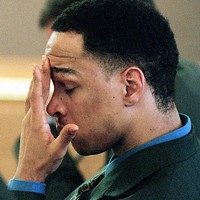Page 2 of 4
"There was a charged atmosphere around the trial," said Rudolf. "Lots of people were very supportive of Rae. Other people were convinced that he was guilty. Having all the CourtTV people and all the local networks as involved I'm sure raised the intensity of people's feelings."
After a trial that lasted 27 days and featured testimony from 72 witnesses -- including several of Carruth's former lovers and confrontational statements by triggerman Watkins (at one point Watkins called Carruth a "bitch" from the witness stand) -- Carruth was found guilty of conspiracy to commit murder, shooting into an occupied vehicle, and using an instrument to destroy an unborn child. But Carruth was found not guilty of first-degree murder, which allowed him to avoid the death penalty and receive a considerably lighter sentence of 18 to 24 years in prison.
"I continue to believe that Rae was not guilty," said Rudolf, who has represented several high-profile clients, including more recently one of the former Duke lacrosse players who was wrongfully charged in the sex scandal. "I think this was something that Van Brett Watkins organized quite on his own. And I don't think Rae was guilty of even the conspiracy. On the other hand, I think the jury did a very good job of assessing the evidence and finding him not guilty of the murder. Frankly, that was an accomplishment that I'm proud of, to be able to show the jury that he wasn't guilty of the murder. That was important to me."
Carruth was the only one of the four accused men to go on trial. The other three accomplices pled guilty. Watkins accepted a plea deal in exchange for his testimony against Carruth. He pled to charges that included second-degree murder and conspiracy to first-degree murder and was sentenced to 50 years and eight months. Kennedy, the driver, was sentenced to 14 years and nine months, and is projected to be released in 2011. Abraham, the passenger in the car with Kennedy and Watkins, was sentenced to three years and three months, and because of credit for time served between his arrest and conviction, he was released in the summer of 2001.
After the prison gate closed behind Carruth and his accomplices, life went on for everyone else -- everyone except Cherica Adams, who had her life tragically taken away at just 24 years of age. Often lost in high-profile cases like this, unfortunately, are the victims. Cherica was the main victim; another victim was her son, Chancellor, who was born with cerebral palsy, a permanent disorder that can limit communication, cognition, and physical movement, usually caused by a lack of development in the brain during pregnancy. He turns 10 on Nov. 16, sharing a birthday with the day his daddy had his mommy shot. He's being raised by Cherica's mother, his grandmother, Saundra Adams.
"We keep our home filled with pictures of Cherica because she's his mother," said Adams. "He knows that she's his mother and we refer to Cherica as his 'mommy angel.' We talk about her every day and we have a prayer we say every night. Because he has cerebral palsy, I don't think Chancellor's going to understand the details of what happened. But what I tell him about the situation is that he was loved, that he was created in love, and that his dad just did a bad thing."
Chancellor, who attends school in CMS, has braces on his legs and has to use a walker or motorized wheelchair to get around. His speech is limited, but he understands more words than he can speak. He's doing a lot better today than doctors expected when he was delivered 10 years ago during an emergency cesarean section -- skin blue, after periods of not breathing. Doctors told his grandmother that he would probably never be able to walk.
"The prognosis they gave me at birth was that he wasn't going to be doing that well," Adams said. "He suffered a great lack of oxygen at the time that she was shot. They had to go in and somewhat revive him and put him on breathing machines. However since that time, he's doing a lot of physical therapy, occupational therapy, and speech therapy. He's saying a lot of words very clearly. His comprehension level is really amazing. He can carry on a conversation with you because he understands what you're saying. He can't always communicate back to you, but we have our own little communication so I understand him."
Adams is remarkably positive when discussing how her life and the life of her family were forever changed. Not only did she lose her only child, but she has to care for her grandson, who requires around-the-clock assistance (she admits to being "overprotective" of Chancellor and doesn't like to ask too many people for help). Time heals most wounds and often makes it easier to deal with tragedies years later, but Adams made an important decision years ago.


